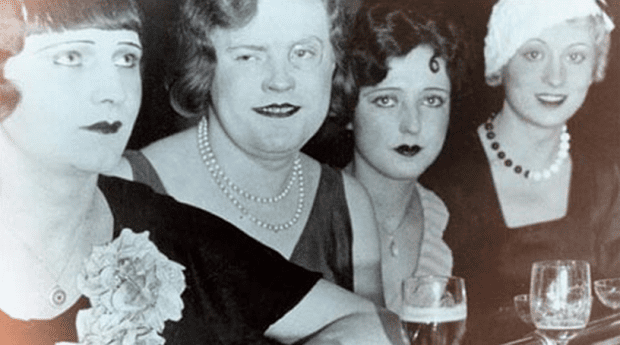Imagine a world where glamorous whores dipped rose petals in cocaine and ate them to get high. Where one could pop into the Dorian Gray bar for live lesbian SM shows on a Wednesday night. A place where a transvestite ball drew massive crowds. These are only a taste of a city that once had something to satiate even the most exotic of appetites. Though Christopher Isherwood routinely dismissed the highly romanticized idea of “decadent Berlin,” the portrait painted by author and academic Robert Beachy in his excellent new book, Gay Berlin: Birthplace of a Modern Identity, makes a solid case to the contrary.
Though much has been written about both the Weimar Republic and the city of Berlin, English-language studies of Berlin’s queer history are scant; aside from James Kollenbroich’s Our Hour Has Come, which surveys the history of the gay emancipation movement in Germany, as well as three biographies of the movement’s founder, Dr Magnus Hirschfeld, the field of scholarship is definitely lacking. The limitation of available source material in English makes Beachy’s project feel not only essential, but it also presents a particular challenge: how to write a worthy survey for the curious lay-reader while still contributing to the slowly growing academic scholarship. Gay Berlin rises to this challenge and succeeds on both counts.
Beachy explores not only the LGBT rights movement as it eventually coalesced around a small yet vocal group of scientists, human-rights activists and politicians in Berlin in the early 20th century, but also the movement’s pre-history. He begins with Karl Heinrich Ulrichs, a 19th-century advocate for the rights of same-sexers and a man Beachy claims as the first person ever to “out” himself. Ulrichs’s pamphleteering against Germany’s anti-sodomy law served as the early inspiration for gay rights pioneers who would emerge around the turn of the century; men like Hirschfeld, who founded the world’s first gay rights group in 1897, the Wissenschaftlich-humanitäres Komitee (Scientific Humanitarian Committee), with its motto per scientiam ad justitiam (through science to justice).
Hirschfeld picked up the torch from his predecessor in the burgeoning field of “sexology,” Dr Richard von Krafft-Ebing, who wrote a seminal study of human sexuality titled Psychopathia Sexualis. Hirschfeld — himself a dedicated socialist, a Jew and an urning, to use Ulrichs’s term for men who love men — built on Krafft-Ebing’s findings on same-sex sexual urges in men and woman, eventually formulating the revolutionary concept of the inborn nature of homosexuality. Hirschfeld went on to create the notions of transvestitism, as well as transsexuality, and even performed some of the very first sex-reassignment surgeries in his Institut für Sexualwissenschaft (Institute for Sexual Science), which he opened in Berlin in 1919 as an international hub for the study of human sexuality and the promotion of human rights through the scientific method.
Beachy charts the history of Hirschfeld’s rabble-rousing for the repeal of Paragraph 175, the subsection of the German penal code that had criminalized sodomy in Germany since the establishment of the Second German Reich in the late 19th century. Hirschfeld’s pioneering efforts and promotion of queer rights spawned a thriving community of activists, eventually resulting in splinter groups from the Scientific Humanitarian Community that included the “men’s rights” activist and Hirschfeld rival Adolf Brand, and his Gemeinschaft der Eigenen (Community of the Special), and the publisher Friedrich Radszuweit’s Bund für Menschenrecht (League for Human Rights), which became Germany’s largest gay-rights organization.
As Beachy’s narrative continues, he leads us on a tour of what WH Auden called a “bugger’s daydream,” noting that Auden’s friend and fellow swordsman Isherwood famously quipped that he came to the city because “Berlin meant boys.” Beachy provides an entire chapter on Berlin’s rent-boy culture and the history of blackmail that plagued Berlin’s homosexuals. During the Weimar Republic, with censorship laws all but struck down and a rise in internationalism and sex tourism — a subject that also warrants a chapter from Beachy — Berlin usurped Paris as a centre for modernity (and vice) in Europe; conservatives even spoke of the “Berliner luft,” claiming that the air itself contained an intoxicant that drove the Berliners into a sexual frenzy. Alongside this explosion of cultural experimentation and sexual liberation came the slow and steady rise of the National Socialist Party, which would lead eventually to a total repression of Berlin’s queer culture, culminating in the brutal deaths of between 10,000 and 15,000 gay men in Nazi concentration camps.
Ultimately, what makes Gay Berlin such an achievement is the through-line the author provides by following the development of a definable homosexual identity: the contemporary idea of homosexuality as something one could be, as opposed to something one did. Gay Berlin’s accessible prose provides an expert balance of titillation, edification and emotional heft; it is a rare and special accomplishment and the best survey of the history of queer Berlin currently available in English.

 Why you can trust Xtra
Why you can trust Xtra


